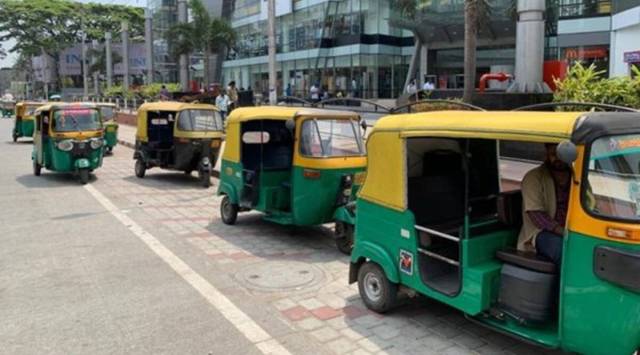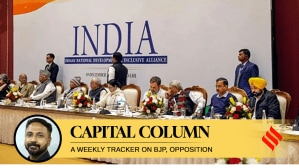Bengaluru: App-cab aggregators continue to offer auto services despite ban
Meanwhile, the Karnataka Transport and Road Safety department has announced a first-time offence penalty of Rs 5,000 per vehicle if cab aggregators are found operating three-wheelers.
 The state government also directed auto-rickshaw drivers not to charge fares higher than the minimum amount of Rs 30 for three km fixed by the state government for regular auto-rickshaw services in Bengaluru. (Representational/File)
The state government also directed auto-rickshaw drivers not to charge fares higher than the minimum amount of Rs 30 for three km fixed by the state government for regular auto-rickshaw services in Bengaluru. (Representational/File)Bengaluru-based interior designer Vaishnavi K did not have to wait for much time to book an auto from a ride-hailing app Wednesday, the first day of the ban on online booking of autorickshaws in Karnataka.
“I did not face much of a hassle booking the auto on a ride-hailing app, but I paid Rs 140 for the trip, a Rs 20 increase from what I used to pay earlier. The government’s decision to ban auto services on cab-aggregating apps is definitely bad news, considering that accessing them is easier compared with metered autos,” said Vaishnavi who took the ride from JP Nagar to Koramangala.
Ride-hailing apps Ola, Uber, and Rapido continued to offer three-wheeler services in the southern state, despite the ban that kicked in on Wednesday. In fact, Uber also offered Rs 25 off on auto rides, on Day One of the ban.
Meanwhile, the Karnataka Transport and Road Safety department has announced a first-time offence penalty of Rs 5,000 per vehicle if cab aggregators are found operating three-wheelers.
Prerana and Vaishnavi booked an auto ride online from Jnana Bharati metro station to Visvesvaraya Layout Wednesday. They paid Rs 117 for the 5.2-km ride. Prerana said, “We took an auto ride from Visveswaraya Layout to Jayanagar in the morning through an app-can service despite the ban kicking in… Banning auto services offered by cab-aggregating apps is not a good idea. Regulating the services would have been much better. Moreover, taking a cab ride is not always an option because it is expensive.”
Michelle K, a professional, booked an auto in the morning from Cunningham Road to MG Road after struggling for 45 minutes. “I had to wait 45 minutes to book an auto on a cab-aggregator app. But I still could not take the ride. I had to finally take a running auto. I also took a running auto from MG Road to Koramangala – a distance of about 7km – and the driver charged me Rs 200,” said Michelle.
Meanwhile, Anoushka, another professional, said one app-cab aggregator was charging Rs 100 for an autorickshaw ride from Jayanagar 4th block to 5th block Wednesday, a distance of hardly 1.5 km.
Some autorickshaw drivers welcomed the move to ban auto services on cab-aggregating apps.
Satish Kumar, an auto driver, said: “The cab-aggregator model was never beneficial for auto drivers, considering the amount of commission the companies used to take. Moreover, I transport passengers around the Mysore Road locality, without operating in the city. I get enough passengers in the area and I can do more rides.”
M Manjunath, president of the Adarsha Auto and Taxi Drivers Association, said: “Auto drivers continued to accept bookings despite the ban because they have to take care of their livelihood. The ban on auto services is not a solution at all. The cab aggregators should first address the problem of surge pricing which is impacting the passengers. The fares have literally doubled in the past few days, especially for short distances. This discourages passengers from choosing an auto and it eventually impacts the earnings of the drivers.”













